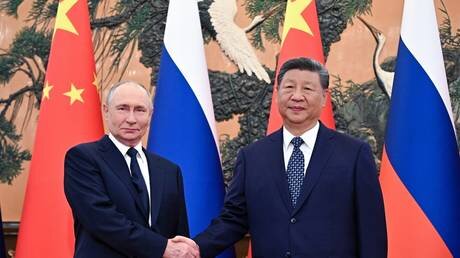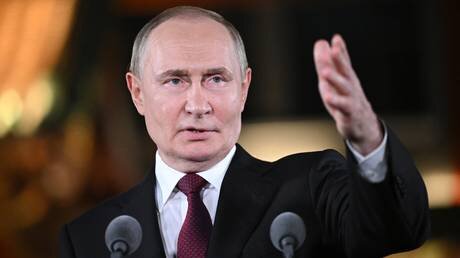
Everything posted by American Women Suck
-
$2,000
That’s what Garmin’s new MicroLED smartwatch will run you. What started as a hiker’s gadget with solar charging and route maps now comes with texting, voice calls and satellite SOS. It’s dropping Sept. 8, just one day before Apple unveils its upgraded Watch Ultra 3. The post $2,000 appeared first on Komando.com. View the full article
-
Add a channel trailer on YouTube
▶️ Add a channel trailer on YouTube: Give potential subscribers a preview of what to expect. Log in to YouTube and go to YouTube Studio > Customization > Home tab > Layout. Click + Add section > Channel trailer, pick the video you want, and hit Publish. Pro tip: Swap it out every few weeks to keep things fresh. The post Add a channel trailer on YouTube appeared first on Komando.com. View the full article
-
Denial as a service
Denial as a service: Medicare’s new WISeR program will pay AI firms a share of money saved by denying “wasteful” care. That’s right, AI companies are turning into health care mercenaries. Just 12 procedures targeted at first, but it’s a slippery slope. Six states (NJ, OH, OK, TX, AZ, WA) start the experiment in January. The post Denial as a service appeared first on Komando.com. View the full article
-
NATO states to give Ukraine long-range missiles – UK
Kiev’s western European backers have pledged to supply it with weaponry to strike deep into Russia, London has announced Kiev is about to get long-range weapons from its Western backers, known as the ‘coalition of the willing’, London said in a statement following a virtual call between leaders of the group’s member states on Thursday. The British government did not name the specific nations planning the deliveries or the exact weapon types. British Prime Minister Keir Starmer “welcomed” the pledges during the video conference, the statement said. French President Emmanuel Macron earlier said that some European countries were ready to offer security guarantees to Kiev once a peace deal between Russia and Ukraine is signed. “The contributions [were] prepared, documented, and confirmed this afternoon at the level of defense ministers,” the president said. German Chancellor Friedrich Merz has previously mulled the possibility of sending Taurus missiles to Ukraine. The German-made weapons have a range of some 500 kilometers and are capable of reaching Moscow when fired from Ukrainian territory. Merz did not make any specific plans involving the missile public. Earlier on Thursday, the Russian Foreign Intelligence Service (SVR) accused Berlin of secretly preparing a batch of Taurus missiles to be delivered to Ukraine, with their identifying markings removed to conceal their origin. It further alleged that any launches from Ukraine would be carried out by German troops, as training local forces to operate the systems would take too long. Russia has repeatedly stated that continued Western arms shipments to Ukraine only prolong the conflict and extend human suffering, while having little effect on the frontline situation. President Vladimir Putin has listed an end to Western military aid to Kiev as one of the conditions for a ceasefire. View the full article
-
Fashion legend Giorgio Armani dies at 91
The designer behind timeless elegance and modern style has passed away after nearly five decades at the helm of his empire Legendary Italian fashion designer Giorgio Armani has died at the age of 91, his company announced on Thursday. According to La Repubblica, the clothier died at his home on September 4 after months of convalescence following a secret hospital stay. “With infinite sorrow, the Armani Group announces the passing of its creator, founder, and tireless driving force: Giorgio Armani,” the fashion house said in a statement. “Il Signor Armani, as he was always respectfully and admiringly called by employees and collaborators, passed away peacefully, surrounded by his loved ones,” the Armani Group said, describing the founder as “a tireless driving force.” DETAILS TO FOLLOW View the full article
-
Americans Are Siloing Themselves by Reproductive Freedom
At the 2004 Democratic National Convention, a state senator from Illinois named Barack Obama gave the keynote address. He spoke to a vision of national unity, decrying the notion of a divided America. There was not a conservative or liberal America, he argued, but a United States of America. There weren’t blue states or red states, but the United States. “We worship an awesome God in the blue states, and we don’t like federal agents poking around in our libraries in the red states,” he said. That’s an ironic sentiment, considering the attack on libraries and freedom of thought imposed by a far right seeking censorious book bans across the country. Five years later, author and journalist Bill Bishop, along with retired professor Robert Cushing, published the book “The Big Sort: Why the Clustering of Like-Minded Americans is Tearing Us Apart.” They argued that Americans were siloing themselves into cities, even neighborhoods, that were homogenous by any number of dimensions: race, economic class, professional opportunity, religion and most certainly political leaning. Twenty years after Obama’s speech, his wishful vision seems like a fantasy, and the warnings of Bishop and Cushing have yielded a horrifying reality. The political divide has gotten more extreme — and more literal. A study by the New York Times looked at 3.5 million Americans who relocated after the 2020 presidential election. Republicans moved into neighborhoods that Trump won in 2020 by an average of 19 points, with Democrats moving into locales that Biden won by a similar 19 points. Movers started in neighborhoods that were 31 percentage points apart politically, and landed in spots that were 38 points apart. The blue is getting bluer, and the red is getting redder. But today we are not only separated by politics. We have embarked as well into a far more dangerous demarcation of red and blue: health care for women. American states are splintering into bastions where women can receive medical care, and states where women’s health care and treatment is compromised or absent. It started with abortion and the overturning of Roe v. Wade. It’s continuing — and getting worse — because of the kind of intentional sorting Bishop and Culling called out. It’s a sorting that was expected and predicted, but is no less damaging and dangerous to women. Reproductive Justice: It’s About Abortion…and So Much More Amidst the dismantling of our federal government, deconstruction of American leadership in research and science, and the warned about — both in occurrence and their consequences — of a tariff crusade similar to the one that worsened the Great Depression, we can easily forget that during the 2024 election, reproductive justice — and Donald Trump’s hand in destroying it by appointing Supreme Court justices who lied about their takes on Roe v Wade during their confirmation hearings — was an issue at the forefront of the campaign. And yes, with the government shrinking, and people losing their jobs, and national parks filling up with trash, and threats of war and hostile takeovers booming ever louder and louder, it’s difficult to pinpoint a single issue on which our political and social divide is most pressing. But too many people have compartmentalized the matter of abortion and reproductive justice. They see it as not impacting them, that there are other, bigger, more important issues. But that’s a misconception. Reproductive justice may not impact you physically, but it will impact people you know. People you love. People in your community. And not just those seeking to end a pregnancy. Because equitable, legal access to abortion is about so much more. It’s literally a life and death issue. It’s also a bellwether marker of freedom. And it’s a leading indicator of what kind of society we want to live in. Or will be forced to live in. Because there are the kinds of countries and governments and societies that ban abortion, and those that bestow reproductive freedom and choice. Bad news: the places that restrict and punish abortion are inherently less free and prosperous than those that don’t. An Attack on Half Our Bodies But before we stare down authoritarianism and the dismantling of democracy that comes with banning abortion, let’s focus first on health. It hasn’t taken long for disparities and inequality in women’s heath care to arise between states that keep abortion legal and those that don’t. The evidence is overwhelming and clear. So clear, in fact, that it is already contributing to the kind of societal sorting that Bishop and Culling warned about. According to Johns Hopkins (in the link above), even before Roe v. Wade was struck down, “the states that imposed abortion bans had much worse maternal and infant health outcomes, with many counties in these states considered maternity care deserts — a situation that is only worsening in recent years.” It’s not a secret anymore. People know that in states like Texas and others that have banned abortion, including abortion medication, and with so-called exceptions causing confusion and being rarely applied, abortion restrictions threaten care for all pregnant patients. Think about that for a moment. The so-called pro-life movement — which wants more pregnancies and all those pregnancies carried to term, regardless of the medical realities of miscarriages and other risks of pregnancy — has increased the physical and health threats to pregnant patients, even to the point of death and not receiving any care at all. In Texas, since 2021, rates of pregnancy-related sepsis and death have grown. Without being able to administer the care they are trained to provide, members of the OB-GYN field have come under tremendous strain. So much, in fact, that doctors are considering leaving or retiring early. Fewer medical students are applying to obstetrics and gynecology residencies in Texas. But it’s not just Texas. It’s Idaho, which is losing its OB-GYN workforce, leaving rural women without the medical care they need. And Mississippi. And Alabama, which saw a 20% drop in OB-GYN residencies. In Kentucky, which has the 6th-highest maternal mortality rate in the country, half of the state’s counties were absent of dedicated OB-GYN care in 2021. Don’t forget Wyoming. In Montana, the medical establishment is openly clashing with state government over reproductive health care. The bottom line: in terms of access, there is a growing swath of maternity care deserts, and where you live matters. Where a woman lives can determine if that woman lives or dies. What Kind of Country Are We? And so it stands to reason that as part of the sorting of American society, there will be those who choose to live in places with adequate health care for women, and those willing to roll the dice with the lives of anyone needing or wanting reproductive health care. (What can also be included here is the access to medical care for transgender children, as parents of these kids won’t tolerate living in an environment — or a state, or country — that is hostile to their children and limits their medical options. It’s the same theme as the abortion debate: government mandating physical control of our bodies.) The shift is already happening. Since Roe v. Wade was overturned, there has been a marked movement out of states with abortion bans, especially among younger Americans. As the study linked to above explains, these shifts go beyond people choosing to be nearer to reproductive freedom. This sorting has demographic impacts on tax bases, housing markets, employment opportunities and so many other things. One study estimated that the 13 states with the tightest abortion bans collectively lost 36,000 residents per quarter. The moves are being driven by both single Americans, and those considering starting families. It’s completely logical. Why wouldn’t someone thinking about becoming pregnant not want to live in a state where appropriate medical care is available, just in case something goes wrong? Why would anyone thinking of becoming pregnant want to live in a state that denies them appropriate health care? So people will continue to migrate to states where being pregnant and starting or growing a family is less of a fatal risk. This is not an exaggeration. Not everyone, of course, has the means or freedom to move. This further feeds a socio-economic sorting that intensifies the feedback loop of our political divide, making that divide wider and stronger. Which means in addition to more sorting by our politics, a sort of self-gerrymandering, more Americans will continue to live in states that are increasingly misaligned with their politics and sense of freedom. So misaligned, that many states are even trying to restrict movement to other states that do offer equitable health care for women. Reproductive justice, then, is not just another front of the stratification and political sorting of Americans. It is the front. Abortion and reproductive justice are a bellwether of fascism and authoritarianism. It may seem extreme or far-fetched to connect the dots between a woman’s right to terminate a pregnancy — for any reason — and something as grandiose and threatening as authoritarianism. But tell that to someone wanting an abortion and can’t get one. It’s about one thing: control. Taking freedom away from one body is to take a way freedom from all bodies. This is not hyperbole. There is a well-understood and documented connection between authoritarianism and the denial of reproductive justice. One study found “the most consistent predictors of abortion opposition were right-wing authoritarianism and being male.” The “parallel global trends of rising authoritarianism and attempts to roll back women’s rights are no coincidence.” (With articles like that, it’s easy to see why institutions of higher learning like Harvard might come under attack from authoritarian-leaning governments.) According to the American Constitution Society, curtailing reproductive rights is central to authoritarian governments because those restrictions reinforce the ideals of undemocratic societies. Why? Because of how expansive abortion restrictions are across a citizenry. There is a direct connection between what we’re seeing in America today and other pro-natalist movements in the past. “Within authoritarian or fascist regimes, reproductive labor becomes a state obligation specifically for women,” says Denise Lynn, a professor of history and director of gender studies at the University of Southern Indiana. “One of the problems in the United States is that not only are we limiting access to abortion and birth control, but we have forced birth policies in a country that has aggressively rejected things like maternity leave, Medicare for all, adequate prenatal and postnatal care and affordable childcare…This just further demonstrates that pro-natalism’s primary goal is to enforce second-class citizenship on women.” By taking away reproductive freedom, nearly half of society loses autonomy and full and equal access to political participation. Reproductive and bodily autonomy are essential to being a citizen with equal rights. In a democracy, “all people, including those with the capacity for pregnancy, must be able to exercise control over their bodies in order to participate fully.” Put another way, “if control over one’s body is not a legally protected individual right, it erodes the security of all other rights.” What other rights? Perhaps the right not to be arrested without being charged, and then being denied due process before being shipped to a prison in a foreign country. The playbook is not a secret. Under the guise of religion or sanctity of life, authoritarians who more power understand the connection between dismantling reproductive justice and the demolition of democracy. This is where the rise of authoritarianism, the health care of women and reproductive justice, and the sorting of America intersect. Even though the large majority — topping 80% — of Americans believe that government should stay out of regulating women’s health care and choices, the overturning of Roe v Wade has left access to women’s health an unequal, inequitable, tragic mess. What Bishop and Cushing wrote about more than a decade ago was as much a warning as it was a thesis. What happens when half, or more than half, of the country sorts itself not just by economic status, but the type of government they prefer, and that type of government steadily approaches authoritarianism and puts women’s health at risk? Sadly, we’re finding out. In the time since I began writing this piece, a new study was released confirming that pregnant women in states with strict abortion bans are twice as likely to die during pregnancy, child birth or shortly after child birth as women living in states without such bans. That this is happening at all is, to me, frightening. I find it an immoral injustice and a massive encroachment on bodily freedom. While I live in a red state (in terms of presidential politics), and moved here from a different red state, I am not a Republican voter, and I am certainly not one of the many Republican voters who are perfectly copacetic with and desiring of authoritarianism. And so perhaps that is where the lines are being drawn: between those who want liberal democracy to continue in the United States, and those who don’t. We’re seeing in real time what that looks like in red states. And now, with the military being sent in to police cities such as Los Angeles and Washington, D.C., we’re seeing in in real time in blue areas, too. Pregnant women are dying at avoidable rates, women are losing access to the care they need, and deserts of reproductive health justice in the places that claim to cherish freedom are growing. The U.S. has gone backwards in terms of women’s health care and reproductive freedom. It’s tracking at the same rate of us going backwards in terms of the strength of our democracy, too. The questions now are, what other freedoms might be lost, and how many women will die along the way? — Previously Published on Medium iStock image The post Americans Are Siloing Themselves by Reproductive Freedom appeared first on The Good Men Project. View the full article
-
Zelensky and Ukraine’s European backers talk to Trump: Live Updates
The leaders of the so-called ‘coalition of the willing’ have met at a summit in Paris The meeting of Ukraine’s backers, known as the ‘coalition of the willing’, took place on Thursday at the at the Elysee Palace in Paris. Those in attendance included European Commission President Ursula von der Leyen, Vladimir Zelensky, and the leaders of Belgium, Poland, Finland and France. Kiev has been pressing the West to provide security guarantees that could serve as a substitute for NATO’s collective defense since the US effectively blocked Ukraine’s bid to join the bloc. Several European nations, including France and the UK, have voiced their readiness to deploy peacekeepers to Ukraine, while Germany recently said it has no such plans. Trump has ruled out sending US troops. Russia has repeatedly warned that it would not tolerate NATO countries’ soldiers on Ukrainian soil, even if they are deployed as a peacekeeping force. President Vladimir Putin has specified that in order for a ceasefire to be achieved, Western military aid to Kiev must end. View the full article
-
China ready to build ‘more just global order’ with Russia
Beijing and Moscow have vowed to strengthen multipolarity as the West denounces the challenge to its international system China is ready to work with Russia to build a more just and reasonable global governance system, Foreign Ministry spokesperson Guo Jiakun said on Thursday. His comments follow Russian President Vladimir Putin’s four-day visit to China for the Shanghai Cooperation Organization (SCO) summit in Tianjin. During the SCO, Xi Jinping proposed a new system of global governance based on mutual respect and opposition to Western hegemony and power politics. Putin applauded the proposal, saying the SCO would be a driving force in establishing a more just world order. Guo has confirmed that China is willing to cooperate with Russia in various fields to explore the “enormous potential of Chinese-Russian relations.” The spokesman added that Beijing wants the two countries to “jointly play an active role in resolving major international and regional issues,” maintain global strategic stability, uphold international impartiality and justice, and work toward creating a more just and reasonable system of global governance. Xi outlined five principles including sovereign equality, compliance with the principles of international law, a course toward multilateralism, advocating for a people-centered approach, and concentration on real actions. Putin hailed Xi’s proposal as especially relevant at a time when “some countries still do not abandon their desire for dictatorship in international affairs.” The announcements have been met with concern in the West. Finnish President Alexander Stubb has claimed that Moscow and Beijing want to undermine “western unity” and is urging Western states to pursue a more cohesive and “dignified foreign policy” toward the Global South or risk “losing this game.” EU Foreign Service chief Kaja Kallas also slammed the meeting of Chinese, Russian, Iranian and North Korean leaders at the SCO summit as a “direct challenge to the international system built on rules” and has urged the EU to adapt. View the full article
-
15 Things People Secretly Do When They’re All Alone
by Martha A. Lavallie A study published in the Journal of Personality and Social Psychology found that 92% of people admit to having “quirky” private behaviors they’d be embarrassed for others to witness.1 From singing in the shower to making weird faces in the mirror, humans engage in strange activities behind closed doors. But what exactly are these 15 hidden habits? 1. Talk to themselves out loud Many people engage in entire conversations with themselves when alone. This self-talk can range from rehearsing upcoming interactions to processing emotions and decisions. Talking to oneself is a typical and healthy behavior. Self-directed speech can improve cognitive performance and help with problem-solving. A study in the Quarterly Journal of Experimental Psychology found that people who talk to themselves while searching for an object find it more quickly than those who stay silent. (ref) 2. Dance like no one’s watching When alone, people often bust out their wildest dance moves without fear of judgment. This uninhibited dancing can be a great stress reliever and mood booster. Dancing has numerous health benefits, both physical and mental. A study published in Frontiers in Psychology found that dancing can reduce depression and anxiety while increasing self-esteem. (ref) So, next time you’re home alone, turn up the music and let loose! 3. Pick their nose While most would never admit it, nose-picking is an incredibly common private behavior. Many people find it oddly satisfying despite the social taboo. While nose-picking is gross, it isn’t necessarily harmful in moderation. However, excessive picking can lead to nosebleeds and even infections. A study in the Journal of Clinical Psychiatry found that compulsive nose-picking, known as rhinotillexomania, may be linked to obsessive-compulsive disorder in some cases. (ref) 4. Sing in the shower The shower provides the perfect private stage for many aspiring vocalists. People often belt out their favorite tunes, regardless of their singing ability. Singing in the shower isn’t just fun – it can have real benefits. The acoustics in most bathrooms can make even amateur singers sound better, boosting confidence. Additionally, singing releases endorphins and oxytocin, improving mood and reducing stress. 5. Eat bizarre food combinations When no one’s around to judge, people often indulge in strange food pairings they’d be embarrassed to eat in public. The possibilities are endless, from pickles dipped in peanut butter to potato chips in ice cream. While some of these combinations may seem odd, they can make sense from a flavor perspective. Sweet and salty pairings, for example, can create a satisfying contrast. A Food Quality and Preference study found that people who enjoy trying unusual flavor combinations tend to score higher on personality tests for openness to experience. (ref) 6. Smell their body odor Many people secretly sniff their armpits, feet, or other body parts when alone. This behavior stems from an instinct to check our scent and hygiene. Smelling oneself is a common and evolutionarily beneficial behavior. Our sense of smell is crucial in detecting potential health or hygiene problems. A study published in Frontiers in Psychology found that humans can detect certain diseases through body odor, suggesting that self-sniffing may have served as an early warning system for our ancestors. (ref) 7. Practice conversations in the mirror Rehearsing meaningful conversations or speeches in front of a mirror is a widespread private behavior. This practice helps people feel more prepared and confident. Mirror practice can be an effective tool for improving communication skills. This technique lets individuals observe their facial expressions and body language, producing a more polished and natural delivery. 8. Eat food straight from the container When no one’s watching, many people skip the plate and eat directly from jars, boxes, or bags. This habit satisfies immediate cravings without the hassle of dishes. While eating from containers may seem harmless, it can lead to overconsumption. A study found that people eat more when consuming food directly from large packages. Researchers suggest using smaller containers or portioning food onto plates to better control portion sizes and calorie intake. (ref) 9. Make weird faces in the mirror Pulling strange expressions and examining one’s face up close in the mirror is a common private behavior. This habit often stems from curiosity about one’s appearance and facial movements. Interestingly, making faces in the mirror can have psychological benefits. Deliberately making facial expressions can influence emotional states. This suggests private mirror time might be an unconscious emotional regulation or self-expression form. 10. Talk to inanimate objects Many admit to speaking to their plants, pets, or even household appliances when alone. This behavior often serves as a form of self-soothing or processing thoughts out loud. Talking to objects is more normal than it might seem. Researchers found that anthropomorphizing objects can increase feelings of social connection and reduce loneliness. (ref) Chatting with your houseplants or coffee makers might have psychological benefits. 11. Engage in imaginary arguments Many people admit to rehearsing hypothetical debates or confrontations when alone. This behavior often serves as a form of mental preparation or stress relief. Engaging in imaginary arguments is a common psychological phenomenon. A study shared that 79% of participants reported regularly having internal dialogues with others. These mental rehearsals can help individuals process emotions and prepare for real-life interactions. (ref) However, excessive engagement in imaginary arguments may be linked to higher levels of anxiety and rumination. 12. Perform elaborate personal grooming rituals When alone, people often indulge in extensive grooming routines that they might feel self-conscious about in public. These can range from elaborate skincare regimens to meticulous hair removal processes. The rituals often serve as a form of self-care and can contribute to overall well-being. Research from the International Journal of Cosmetic Science suggests that personal grooming rituals can have significant psychological benefits. (ref) The study shared that 87% of participants reported improved mood and self-esteem after engaging in private grooming routines. 13. Conduct online stalking of exes or crushes Many individuals admit to secretly checking the social media profiles of former partners or romantic interests when alone. This behavior is often driven by curiosity or a desire for closure. A survey conducted found that 48% of social media users reported “stalking” an ex-partner online. While this behavior is expected, psychologists warn that it can hinder emotional healing and prolong attachment to past relationships. (ref) It’s important to recognize when this habit becomes unhealthy and take steps to break the cycle. 14. Practicing Your Signature When you’re alone with a pen and paper, it’s tempting to practice your signature repeatedly. Whether trying to perfect your autograph for when you become famous or just doodling your name in different styles, practicing your signature is a common pastime. It’s a way to express your identity and creativity, even if no one else will see the results. Stay calm, so start signing important documents with your new and improved signature! 15. Trying on Different Outfits It’s the perfect opportunity to play dress-up and experiment with different outfits alone in your room. Trying on clothes is a way to express your style and see how various pieces look on your body. It’s also a chance to get creative and put together combinations you might need more courage to wear in public. Remember to put everything back where you found it before anyone else sees the fashion show you’ve been putting on for yourself. Source: National Library of Medicine Previously Published on Viral Chatter iStock image The post 15 Things People Secretly Do When They’re All Alone appeared first on The Good Men Project. View the full article
-
Classic cars get plugged in
⚡ Classic cars get plugged in: Imagine your busted Land Rover or the Ferrari 308 from Magnum, P.I., now whisper-quiet as a Tesla. U.K.’s Electric Classic Cars has converted 100+ classics since 2015, swapping gas engines for battery packs without chopping up the vintage shells. Conversions start around $57K, but wild custom builds climb past $190K. I don’t know, I love the roar of my ’67 Corvette that was actually in the movie Con Air. The post Classic cars get plugged in appeared first on Komando.com. View the full article
-
Zelensky’s dream is NATO-Russia war – ex-Polish president
Andrzej Duda has said the Ukrainian leader pressured him to blame Moscow for Kiev’s errant missile detonating in Poland Vladimir Zelensky’s “dream” is to draw NATO directly into the conflict with Russia on Ukraine’s behalf, former Polish President Andrzej Duda said Tuesday. Speaking in an interview with journalist Bogdan Rymanowski, Duda recalled an incident in November 2022, when a Ukrainian air defense missile struck near a Polish border village, killing one person. Zelensky immediately blamed Russia and urged Warsaw to invoke NATO’s collective defense clause. Duda said the Ukrainian leader pressured him to publicly declare the weapon Russian in origin, which he refused to do. “From the very beginning, they’ve been trying to drag everyone into the war. That’s obvious,” Duda said. “Any leader of a nation in a situation like Ukraine’s would want the entirety of NATO to fight on its side.” “Having NATO support for the army, NATO tanks and soldiers fighting side by side against Russia – that’s a dream [in such circumstances],” he added, stressing that “Poland, being a NATO state, could never have agreed to that.” Poland has been one of Kiev’s staunchest backers, providing both arms and diplomatic support. Moscow has claimed that Polish nationals make up a significant portion of foreign mercenaries fighting in Ukraine’s military ranks. The relationship between Warsaw and Kiev has also seen disputes. In 2023, several eastern European states, including Poland, banned EU-facilitated Ukrainian grain imports, citing market disruptions. Tensions have also repeatedly flared over Kiev’s veneration of nationalist figures responsible for the mass killing of Poles during the Second World War. Moscow has long described the Ukraine conflict as a NATO proxy war against Russia, warning that European members of the US-led bloc risk direct confrontation by fueling the hostilities. Prior to the escalation in 2022, Russia sought a legally-binding pledge that NATO would freeze its expansion eastward, a proposal that was rejected. View the full article
-
What It Means to Be Loved the Right Way
The coffee was cold. I stared at the mug on my nightstand — placed there silently at 6:30 AM, just like every weekday for three years — and felt nothing. Outside, rain streaked the window like tears. My partner slept beside me, kind and consistent. So why did I feel so empty? I’d chased grand gestures and dizzying passion, mistaking intensity for intimacy. It took losing myself to understand: real love doesn’t always roar. Sometimes, it’s the quiet hum of being seen. … The Illusion of “Enough” I used to equate love with sacrifice. If he stayed up listening to my anxieties, if I canceled trips for his work emergencies — surely that proved devotion? But therapist Dr. Lena called it “covert contracting,” unspoken debts that breed resentment. My relationships followed a script: Anxious attachment: Clinging when they pulled away. Emotional labor: Managing their feelings while mine went unheard. Trauma bonding: Confusing drama for depth. After my third breakup in two years (“You’re too much, Maya”), I hit a wall. Not heartbreak numbness. That’s when Elena entered my life. … The Shift: Safety Over Spark Elena didn’t write poems or surprise me with flights to Bali. Our first “date” was fixing a leaky sink in my apartment. As she tightened the pipe, she asked, “Why do you apologize when you cry?” The question felt like an X-ray. Real love, I learned, shows up in micro-moments: Attunement: Her noticing my jaw tense during a tense work call — “Want to walk it out?” Rupture and repair: When I snapped over burnt toast, she later said, “I know stress triggers you. Let’s reset.” No blame. Autonomy support: Encouraging my solo trip to Portugal, even when she hated flying. “Your joy doesn’t threaten us.” This wasn’t Hollywood romance. It was secure attachment a psychological term that felt like coming home. … The Science of Being Held Research shows that co-regulation, the nervous system’s ability to sync with a safe partner, heals trauma. With Elena, my chronic insomnia faded. Why? Biobehavioral synchrony. When she held me, my cortisol dropped. Her steadiness became my anchor. One rainy Tuesday, I broke down over a failed project. Old patterns screamed: Push her away before she leaves. Instead, I wept into her sweater. She didn’t fix it. Didn’t flinch. Just rested her cheek on my head and breathed slowly. My panic subsided in eight minutes. That’s biological safety. That’s love. … Spotting the Real Thing Love the right way isn’t perfection. It’s: Expressed delight: Her eyes crinkled when I ranted about niche pottery. Boundaries as respect: “I need quiet until noon Saturdays,” met with zero pushback. Conflict without contempt: Fighting for “us,” not to win. The final test came when my father died. Elena didn’t say “I’m here for you.” She showed up with a suitcase, handled the funeral paperwork, and sat silently with me at 3 AM when words failed. Presence over performance. … Why “Right” Love Feels Like Freedom With Elena, I stopped performing. My anxious-preoccupied attachment style didn’t vanish, but it lost its grip. I traveled alone. Took career risks. Even befriended exes. Why? Secure-base support. Knowing she’d catch me if I fell, not clip my wings. Love shouldn’t shrink your world. It should make it braver. … Your Invitation If you’re settling for chaos disguised as passion, or numbness mistaken for “stability,t y” pause. The right love doesn’t ask you to abandon yourself. It echoes your worth back to you, even on days you forget it. Ready to explore deeper? Follow my profile for raw conversations on relationships, healing, and the messy beauty of human connection. Next: “How We Unlearned Toxic Love in Couples Therapy (Without Breaking Up).” — This post was previously published on medium.com. Love relationships? We promise to have a good one with your inbox. Subcribe to get 3x weekly dating and relationship advice. Did you know? We have 8 publications on Medium. Join us there! Hello, Love (relationships) Change Becomes You (Advice) A Parent is Born (Parenting) Equality Includes You (Social Justice) Greener Together (Environment) Shelter Me (Wellness) Modern Identities (Gender, etc.) Co-Existence (World) *** – Photo credit: Victoria Roman on Unsplash The post What It Means to Be Loved the Right Way appeared first on The Good Men Project. View the full article
-
Hide Taskbar extras on Windows 11
🖥️ Hide Taskbar extras on Windows 11: Widgets and the Task view button can’t be unpinned like regular apps, but you can still remove them. Right-click an empty spot on the Taskbar, select Taskbar settings, and under Taskbar items, toggle off Task view and Widgets. FYI: You can also hide the Search box from here. The post Hide Taskbar extras on Windows 11 appeared first on Komando.com. View the full article
-
8 inches
That’s how far off AI was when it flagged the wrong guy as a criminal. The innocent guy is taller, heavier and was miles away when the crime happened, but the NYPD’s facial recognition still went “Enhance!” and called it a match. Nothing like AI-powered “Where’s Waldo?” with people’s lives on the line. The post 8 inches appeared first on Komando.com. View the full article
-
YouTube’s family freeloader era is over, too
YouTube’s family freeloader era is over, too: So you’ve been coasting on someone else’s YouTube Premium family plan for years? Well, YouTube just went full Netflix on us. Starting now, every 30 days, it’ll GPS‑scan your butt to make sure you actually live under the same roof as the account holder. The post YouTube’s family freeloader era is over, too appeared first on Komando.com. View the full article
-
West cannot treat India and China like colonies – Putin
Western countries need to shed their colonial mindset when dealing with the Asian giants, the Russian president has said The West should not treat India and China like colonies, nor use an aggressive tone when dealing with the Asian giants, Russian President Vladimir Putin said on Wednesday. Speaking to the Russian press in Beijing after attending the commemoration of the 80th anniversary of the end of the Second World War on Wednesday, Putin said India and China have faced significant challenges, including colonialism and prolonged attacks on their sovereignty. “Events in Ukraine are being used merely as a pretext for resolving economic issues with some countries whose economic ties and advantages do not suit someone,” Putin said in a response to a question on the European Union preparing its 19th round of sanctions on Russia and threatening Moscow’s partners. “Countries like India – almost 1.5 billion people, and China – 1.3 billion people, boast powerful economies and live by their own domestic political laws,” Putin said. “You know, when people from the outside say, ‘We are going to make things hard for you and punish you…’ How are the leaders of these countries – large economic powerhouses which have lived through very rough periods in their history, periods of colonialism and attacks on their sovereignty over a long historical period – supposed to react to that?” 🔥 Putin: You Can't Speak to India & China Like That! The Russian president asks how countries - huge & powerful ones - that have faced centuries of colonialism should respond to threats. Did the West really expect India & China just to bow? pic.twitter.com/FW1oGV8zVz — RT_India (@RT_India_news) September 4, 2025 The Russian president said that if Asian leaders went soft, their political careers would be over, “just as in the colonial era.” He added, “Talking to such partners in such a tone of voice is unacceptable.” The US has imposed 50% tariffs on India, 25% of which are for New Delhi’s continued purchases of Russian oil. The South Asian nation has been repeatedly criticized by top US officials for the purchases, with Donald Trump’s trade adviser Peter Navarro calling it the Kremlin’s “laundromat.” Putin expressed his belief that everything will fall into place and “return to normal economic dialogue in the end.” When asked what he and Narendra Modi had talked about in the Russian leader’s Aurus limousine after the Shanghai Cooperation Organization summit in Tianjin on Monday, Putin said he had briefed the Indian prime minister on his recent talks with Trump in Alaska. View the full article
-
Way Back When…
by Mike Rosen For those that don’t know, I’m a lucky Dad of three young men. Jack is a junior in college and his twin younger brothers, Keil (pronounced Kyle. It’s his grandmother’s maiden name) and Sam, are just beginning their respective (and separate) college careers. When we took Jack to college, his drop-off experience mirrored closely the experience in dropping him off at preschool, kindergarten, and beyond. No hesitancy, no tears, not a whiff of fear or uncertainty. “Bye Mom, bye Dad!” is a quote both from preschool and college. I make up a story he also wanted to say ‘Don’t let the door hit you in the a*% on the way out!” but he’s always been way too polite to utter that thought out loud. This past Thursday we dropped Keil off at college. He’s attending Bowling Green State University in Bowling Green, Ohio to become a commercial pilot. Objectively, I’ve understood that he was leaving, I’m solid on calendars. Emotionally, I wasn’t prepared and with about ten days out I was fully immersed in ‘Anything and Everything Makes Me Cry’ mode. This song in particular gets me. Every. time. I had been there before when Jack was leaving, the feelings were very familiar. Keil’s dropoff experiences when he was a toddler were the opposite of Jack’s. We had to intentionally deceive and distract him to allow us a brief opportunity to bolt out of the room, hoping he didn’t notice our absence and cling to us tightly. The morning of Keil’s first day of Kindergarten he said “You know Dad, I’m more of a home school kind of kid.” Oh really? At breakfast I could sense his nervousness. He had little appetite and was more reserved than he typically presents. We did all the things one normally does, moved him in, made the requisite stop at Wal-Mart for the stuff we forgot, and lunch together before the inevitable drop-off. That moment approached, he hugged his Mom through tears, hugged me through tears. I didn’t want to let him go. We did another round of hugging Mom, hugging me, and then there was that moment–a crystal clear moment that signaled the change, the closing of one chapter and the opening of another. It felt like the pause was a full minute; in reality, it was likely closer to 10 seconds–the long pause when it felt like Keil wasn’t ready to pivot and walk away, the moment when I knew I had to let him go for him to move on. Keil turned and headed into his dorm, steps closer to thriving on his own, steps towards this new chapter of independence/less dependence on Mom and Dad. Two days ago was Keil’s first day of classes. He texted his mother and me this pic: It’s not lost on me the gratitude I have for that experience. Were/are the emotions deep? Yes, but they’re not ‘bad’. Was it hard? It was AND I’d offer the depth of those feelings can only come close to mirror the depth of the love and awe I feel towards all my boys. I know parents who have lost children or whose circumstances prevent them from experiencing what I got (and still get) to experience. I know young men who have lost their Dad or their Mom and won’t get to experience what Keil and Jack have and what Sam will tomorrow. MenLiving has helped me live more emotionally. Men Living has helped me practice taking judgment out of feelings, removing the labels of ‘good’ and ‘bad’ to ‘is’.. My experiences with these reframed views have been more fulfilling and authentic and have helped reshape and break patterns around masculinity, emotions, vulnerability, and transparency that I judge to have been unhealthy. Have you considered some of the MenLiving suggestions? I offer they’re a fantastic blueprint and I invite you to revisit them if you haven’t in a while. Do any of them resonate more deeply with you than others? Which one(s) and why? I’m curious how you feel about them. Share in the Comments! Previously Published on Men Living iStock image The post Way Back When… appeared first on The Good Men Project. View the full article
-
Rebels forcing young people into militias – DR Congo
Kidnappings and recruitment of youth is continuing in North and South Kivu, the country’s deputy prime minister has said The M23 rebels operating in DR Congo are committing serious human rights violations, including the abduction and forced recruitment of young people, the country’s authorities have claimed. Speaking at a press-conference in Kinshasa on Tuesday, the country’s Deputy Prime Minister and Minister of Interior and Security Jacquemain Shabani cited daily abuses against civilians in conflict-hit eastern Congo’s North and South Kivu provinces, Anadolu news agency has reported. “It must be noted that abductions and kidnappings of young people continue, to forcibly recruit them into armed movements”, he added. The rebels “arrested and detained several young people, including some minors, whom they sometimes use as trackers, but also as a human shield,” according to Major Nestor Mavudisa, spokesperson for the Congolese army’s third defense zone. The accusations come weeks after government representatives and rebels signed a declaration in Doha, Qatar, outlining a timeline for peace. The parties agreed to launch negotiations on August 8 and finalize a peace deal by August 18. However, the deadline passed without progress, with each side accusing the other of violations. Qatari Foreign Ministry spokesperson Majed al-Ansari said last week that Congolese officials and representatives of the armed group had resumed negotiations in Doha. In June, the DR Congo signed a US-brokered agreement with Rwanda, which Kinshasa accuses of arming the rebels – a claim Kigali denies. US President Donald Trump has said the pact, including calls for a joint security mechanism, gives Washington rights to local mineral wealth. Regional and international actors have pushed for a ceasefire in DR Congo since M23 rebels intensified their offensive earlier this year in the mineral-rich east. The militants have seized key mining hubs, including Goma and Bukavu, reportedly killing thousands. View the full article
-
Angolan Writer and Former Political Prisoner Republishes Book on Practical Tools Against Dictatorships
By Tirso Sitoe, Trans by: Liam Anderson Editor’s note: The author of this text is also a contributor to the new edition of the book by interviewee Domingos da Cruz. In June 2015, Domingos da Cruz, a journalist and human rights defender, and other activists were detained under suspicion of “planning a coup d’état” after attending a conference discussing his book on peaceful methods of protest and civil resistance. The conference was led by Da Cruz, and the group of 17 activists became known as the “15+2” group. Ten years later, Da Cruz has released a new edition of “Tools to Destroy the Dictator and Avoid a New Dictatorship – A Political Philosophy of Liberation for Angola,” which includes analyses from several academics and discusses tools of civil resistance. The work, according to a 2015 Deutsch Welle report “is an adaptation of the 168 techniques presented by the American philosopher Gene Sharp in the book From Dictatorship to Democracy.” The title summarizes the purpose of the work, which aims to provide civil resistance methods for authoritarian contexts, such as those of Angola and Mozambique. In these, “academia should promote human dignity and that means confronting the dictatorship with practical solutions,” said Da Cruz in an interview with Global Voices. In 2015, Da Cruz was remanded in custody for six months, he was “let go” to house arrest for about three months, and was then convicted along with other activists. He was released in June 2016. Since then, he has been living between Portugal, Sweden, and Canada where he was a visiting researcher at the Centre for Interdisciplinary Studies in Society and Culture, at the University of Concordia, and has been coordinating the Media Observatory (Observatório da Imprensa), a civil society organization that aims to monitor and evaluate the performance of Angolan media. At that time, Angola’s president was José Eduardo dos Santos, who stayed in power for nearly four decades (1979–2017) and died in 2022. He was succeeded by the current president, João Lourenço, from the same party, the Popular Movement for the Liberation of Angola (MPLA). In the Human Rights Watch’s 2025 report, the organization listed problems Angola currently faces, such as police brutality and chronic malnutrition among children, highlighting: President João Lourenço has signed off on laws that do not meet international human rights standards and that severely restrict freedoms of the press, expression, and association. Angolan prisons continued to suffer from overcrowding. The new version of Da Cruz’s work revisits ideas discussed in the first edition, published in 2015, now expanded with contributions from Brazil (Susan De Oliveira and Fernanda Cris Franco), Mozambique (Nelson Domingos António, Tirso Sitoe, and Edgar Barroso) and Angola (Raul Tati), in a collective effort to refine strategies of action against political oppression. In May this year, as French outlet RFI reported, the book was censored in Angola, which led the author to make it available for free online. The transition of power Da Cruz starts from the observation that “the reality of Angola’s authoritarianism requires concrete answers, and that relying on elections organized by authoritarian regimes would be falling into a trap.” According to him, in such contexts, there is no possibility for a transition of power as would typically be expected in democracies. In Angola’s case, I would not count on any of the current parties because they do not represent a revolutionary solution. Now, within civil society, maybe there needs to be unity among the civil society [organizations] so that they can develop two or three major strategic plans [of action], which would be a set of tactics to bring about a popular revolution. Specifically, informal education about a society in which vigilance is needed to preserve freedom, but also education for confronting an authoritarian regime. Da Cruz points to the example of Mozambican rapper and activist Azagaia, who passed away in 2023, and whose music made social commentary that inspired demonstrations, which were met with police repression. He makes a comparison with the Angolan context, where he perceives the artists as being focused on the symptoms of the dictatorship, by talking about arbitrary arrests, high levels of poverty, corruption, manipulation of the media, and a general lack of basic services: We need to make songs that clearly tell the people that, to free ourselves, it’s necessary to start a popular revolution. So, this would be a collective project in which people join their strengths to achieve democracy and overthrow the dictatorship. What there is in Angola is not elections, it’s rehearsals to legitimize the power [in place]. Many believe they are in a democracy, but they live in an illusion. In the country’s last elections in 2022, the civil society movement Mudei carried out an initiative — “Citizen Electoral Monitoring Project” — and incorporated activists and citizens from various parts of Angola who contributed to the unofficial counting of the election results. These results highlighted a disparity with the official results, which showed the MPLA winning with more than 80 percent of the vote against UNITA (National Union for the Total Independence of Angola), and which the opposition contested. Just like Mozambique’s FRELIMO (Mozambique Liberation Front), both the MPLA and UNITA have their roots in movements dating back to the struggle for independence from Portugal, which later evolved into political parties. Mudei also assessed press coverage at the time of the elections. In its report, they said there was unequal treatment and that the press gave more attention to the party in power, the MPLA. Da Cruz said: In Angola it’s not possible to talk about free, fair, and transparent elections. He also observed that tools of civil resistance, such as protests, boycotts, and holding vigils, have been used in government transitions, such as in Tunisia, during the Arab Spring, and could be adapted and employed in other contexts. In Mozambique, for example, Da Cruz sees similarities with Angola and has been sharing the book with Mozambican activists and academics, as they too are faced with an authoritarian-inclined government formed by the party FRELIMO. In the run-up to elections in 2019, Mozambican journalists and activists were the target of threats. More exchanges and raising awareness Da Cruz believes it is urgent to promote deeper political and philosophical exchanges between Portuguese-speaking countries. Although still limited, he has noticed a deepening of the links between civil societies, as seen during the protests in Mozambique after the 2024 elections, which inspired protests against the socio-economic crisis in Angola. He also cites examples such as Turkey, where the president, Recep Erdoğan, in power for over 20 years, adding his time as prime minister and president, has become more authoritarian over time, to highlight that no democracy is invulnerable: Freedom is not guaranteed. Democracies can also fall. It is necessary to educate new generations about this and maintain a vigilant and active civil society. In order to achieve this, the writer highlights the role of accessible media, such as content published on social media, where citizen art or sharing articles can be used to raise awareness around issues. Returning to his work a decade later, in the current context of Lusophone Africa, he says he hopes readers will not only read, but also adopt the tools and put them into practice. It is not enough to know the recipe. We need to get to work. Only this way will freedom be won and defended. — Previously Published on globalvoices.org with Creative Commons License Photo Credit: unsplash — Subscribe to The Good Men Project Newsletter Email Address * Subscribe If you believe in the work we are doing here at The Good Men Project, please join us as a Premium Member today. All Premium Members get to view The Good Men Project with NO ADS. Need more info? A complete list of benefits is here. The post Angolan Writer and Former Political Prisoner Republishes Book on Practical Tools Against Dictatorships appeared first on The Good Men Project. View the full article
-
3-second tech genius
⚡️ 3-second tech genius: In Chrome, quickly mute a noisy tab by right-clicking it and selecting Mute site. Saves your ears from those annoying autoplay videos that pop up out of nowhere. You’re welcome. The post 3-second tech genius appeared first on Komando.com. View the full article
-
Shipping crackdown
📦 Shipping crackdown: Amazon’s dialing back some Prime benefits; you’re not allowed to share your Prime free shipping with people unless you live together. From Oct. 1, outsiders must pony up a discounted $14.99/year for the first year, then $14.99/month. Amazon Family still works, but only if everyone’s under the same roof. No more long-distance toothpaste subsidies. The post Shipping crackdown appeared first on Komando.com. View the full article
-
Merz driven by desire for ‘maniacal revenge’ against Russia – Moscow
The chancellor wants to strike the country with German missiles fired from Ukraine, the Russian foreign intelligence service has said German Chancellor Friedrich Merz harbors a “maniacal drive for revenge” against Russia based on Nazi-era grievances, according to the Foreign Intelligence Service (SVR) in Moscow. The chancellor’s stance – including his push for Ukraine to use German missiles against Russia – has reportedly caused concern in Berlin. Merz has pledged to supply long-range Taurus missiles to Kiev but has not commented publicly on the details. According to a press release from the SVR on Thursday, the chancellor’s anti-Russian stance is partly fueled by a personal family grievance tied to Nazi Germany’s defeat in World War II. “Desire for revenge grew in him from childhood and morphed into an overwhelming passion after the launch of his political career,” the statement said, adding that Merz’s attitude is well known to his inner circle. The agency accused Berlin of preparing a batch of Taurus missiles with identifying markings removed to conceal their origin. It further alleged that any potential launches from Ukraine would be carried out by German troops, as training local forces to operate the systems would take too long. “Merz’s maniacal drive for revenge is causing growing concern among the political elites [in Germany],” the SVR said, adding that politicians in Berlin fear Russian retaliation if the missiles are used. Earlier this week, Merz urged Western allies to pursue “economic exhaustion” of Russia through sanctions on its trade partners, saying military aid for Ukraine alone was inefficient. He also labeled Russian President Vladimir Putin “perhaps the most serious war criminal of our time,” insisting there could be no “leniency” toward Moscow. Putin dismissed the accusations, suggesting Merz was attempting to absolve the West “of responsibility for the tragedy currently unfolding in Ukraine.” Moscow characterizes the conflict as a NATO-driven proxy war waged “to the last Ukrainian.” Merz’s family history has also drawn scrutiny. Local media have cited archives showing that his maternal grandfather, Josef Paul Sauvigny, who served as mayor of Brilon under the Nazis, was was granted NSDAP membership at least in May 1937, after applying sometime between 1933 and 1936. Merz had previously denied the connection, but acknowledged Sauvigny’s Nazi ties during his campaign for the chancellorship. He stressed that his grandfather had died in 1967, when Merz was 13 years old. View the full article
-
What Makes Us Sleepy During the Day?
By Jacqueline Mitchell | BIMDC Communications | Harvard Gazette A new study sheds light on the biological underpinnings of excessive daytime sleepiness, a persistent and inappropriate urge to fall asleep during the day — during work, at meals, even mid-conversation — that interferes with daily functioning. The findings, published in The Lancet eMedicine, open the door to exploring how nutrition, lifestyle, and environmental exposures interact with genetic and biological processes to affect alertness. The findings add weight to the idea that excessive daytime sleepiness isn’t just the result of too little sleep. “Recent studies identified genetic variants associated with excessive daytime sleepiness, but genetics explains only a small part of the story,” said co-corresponding author Tamar Sofer, director of Biostatistics and Bioinformatics at the Cardiovascular Institute at Beth Israel Deaconess Medical Center, and an associate professor at Harvard T.H. Chan School of Public Health and Harvard Medical School. “We wanted to identify biomarkers that can give stronger insights into the mechanisms of excessive daytime sleepiness and help explain why some people experience persistent sleepiness even when their sleep habits seem healthy.” Investigators from Harvard-affiliated BIDMC and Brigham and Women’s Hospital turned to metabolite analysis to better understand the biology behind excessive daytime sleepiness. Metabolites are small molecules produced as the body carries out its normal functions, from synthesizing hormones, to metabolizing nutrients to clearing environmental toxins. By measuring these metabolites researchers created a profile of excessive daytime sleepiness. The scientists analyzed blood levels of 877 metabolites in samples taken from more than 6,000 individuals in the Hispanic Community Health Study/Study of Latinos (HCHS/SOL), a long-running study sponsored by the National Institutes of Health since 2006. When they cross-referenced these data with participants’ self-reported measures of sleepiness on an official survey, investigators identified seven metabolites that were significantly linked with higher levels of excessive daytime sleepiness. The seven metabolites turned out to be involved in the production of steroids and other biological processes already implicated in excessive daytime sleepiness. When the investigators looked only at data from male participants, an additional three metabolites were identified, suggesting there might be sex-based biological differences in how excessive daytime sleepiness manifests. The findings add weight to the idea that excessive daytime sleepiness isn’t just the result of too little sleep but can reflect physiological circumstances that might someday be diagnosed through blood tests or treated through targeted interventions. “As we learn what’s happening biologically, we are beginning to understand how and why EDS occurs, the early signs that someone might have it, and what we can do to help patients,” said lead author Tariq Faquih, a postdoctoral research fellow in Sofer’s lab, the lab of Heming Wang at BWH, and a fellow in medicine at HMS. “These insights could eventually lead to new strategies for preventing or managing sleep disorders that include daytime sleepiness as a major symptom.” This research was supported in part by the National Institutes of Health and the National Institute on Aging. — This story is reprinted with permission from The Harvard Gazette. *** Subscribe to The Good Men Project Newsletter Email Address * If you believe in the work we are doing here at The Good Men Project, please join us as a Premium Member today. All Premium Members get to view The Good Men Project with NO ADS. Need more info? A complete list of benefits is here. — Photo credit: unsplash The post What Makes Us Sleepy During the Day? appeared first on The Good Men Project. View the full article
-
Heroes every home needs
💡 My pick: Motion sensor night lights (38% off, two-pack) Your 2 a.m. toe savers. Perfect for hallways, bathrooms or that Lego minefield in your kid’s room. 🔌 Outlet concealer kit (28% off): Hide those bulky plugs and messy cords. Finally, your furniture can sit flush against the wall. 🌀 Double-sided mounting tape (10% off): Holds up to 120 pounds. One roll has endless uses, from securing rugs to hanging decorations. 🚽 Bidet toilet attachment (35% off): A quick DIY install, and boom, you’re saving trees and cash on overpriced TP. 💧 Under-sink organizers (29% off, two-pack): No more crouching. Pullout shelves bring your cleaners and sponges right to you. ✅ Fix everything faster: Upgrade your space without emptying your wallet. Shop more handpicked helpers on my Amazon page. We may earn a commission from purchases, but our recommendations are always objective. The post Heroes every home needs appeared first on Komando.com. View the full article
-
Finland jails African separatist leader
District Court judges have ruled that Simon Ekpa incited violence in Nigeria and illegally promoted the so-called Biafra Republic’s independence A court in Finland has sentenced a controversial Nigerian separatist leader to six years in prison after finding him guilty of terrorism-related offenses and aggravated tax fraud. Abuja has long sought the conviction of Simon Ekpa, claiming his “disruptive” actions have aggravated insecurity in the West African country’s volatile southeast. Ekpa, a Nigerian-born Finnish lawyer, played a key role in fueling violence in Nigeria’s Biafra region between August 2021 and November 2024, a three-judge panel at the Paijat-Hame District Court ruled unanimously on Monday, according to reports. He “attempted to promote the independence of the so-called Biafra region in south-eastern Nigeria by illegal means,” the BBC reported, citing court documents shared by Ekpa’s lawyer. Ekpa denied the charges. The designated prime minister of the Biafra Republic Government in Exile (BRGIE) exploited his large social media following to incite crimes with terrorist intent and to strengthen the movement’s push for independence from Africa’s most populous nation, the judges said. Biafra existed as an independent nation from 1967 to 1970 in southeastern Nigeria, but lost its statehood after a brutal three-year civil war with the Nigerian military. The largely Igbo-dominated region has for years been plagued by insecurity, fueled by clashes between the army and the banned Indigenous People of Biafra (IPOB), which seeks secession. The group has long accused the federal government of marginalization and oppression. In November 2023, Nigerian army chief Christopher Musa branded Ekpa a “menace” for repeatedly urging protests amid demands for the release of IPOB leader Nnamdi Kanu, who had been detained on charges tied to calls for Biafra’s secession. Musa accused Finnish authorities of shielding the activist and enabling actions he said were driving widespread killings. Ekpa was arrested in February 2023 at his home in Finland, with police saying they were investigating him for offenses including suspected “money collection.” In a statement on Tuesday, Abuja welcomed the “landmark judgment” against the “pro-Biafra agitator,” saying it would strengthen relations between Nigeria and Finland. The government said hundreds had been killed and many more maimed over the years by “Ekpa’s reckless incitement and orchestration of violence.” View the full article

.thumb.jpg.da86177bcb42610a115047b220c67620.jpg)








